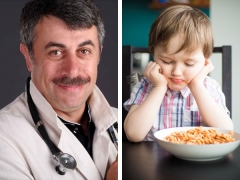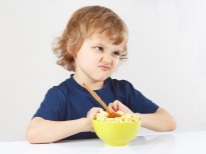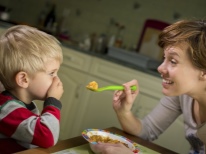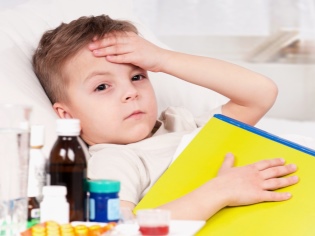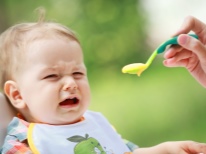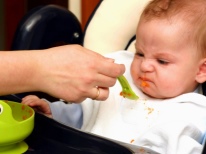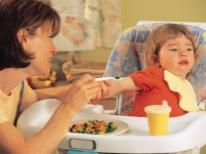Doctor Komarovsky’s tips on what to do if a child has a bad appetite.
A good appetite for a child is a source of endless joy in parents. There is nothing more pleasant than to see how a child eats a cooked lunch, dinner or breakfast with pleasure. But more often the opposite happens. Mom and grandmother tried to cook, and not just like that, but exactly what loves the little tot. And the kid persistently refuses to eat and naughty.
In some families, each meal is transformed into a real battle between the “neuchuhoy” and his insistent parents. They persuade the child, try to deceive him with various maneuvers and tricks, insist and threaten that he will not get candy if he doesn’t eat the soup. Do you need to try so hard and what to do if your child has a bad appetite, says a well-known children's doctor Yevgeny Komarovsky.
Appetite is different
Without food, life is impossible, but appetite does not always come with eating. Natural appetite occurs when food is required by the body to replenish energy reserves in order to survive. A selective accompanies the modern man more often. The child wants a cookie, because he likes it, and does not want porridge, because cookies are better.
Selective appetite reflects the real picture of needs only in an infant; at 8-9 months he intuitively feels that he needs calciumand refuses to eat soup. Not because the soup is tasteless, but because milk more useful. At the age of 1 year, 2 years, children for the same reason prefer dairy products.
If a one-year-old child does not eat meat in principle, this does not mean that in 3-4 years he will not start to eat him with pleasure. Just for the 12-month crumbs are more important vegetables and fruits, cottage cheese and milk. And he understands this on an intuitive level.
Closer to 3 years, the problem of electoral appetite, according to Komarovsky, is far-fetched - if the child does not eat vegetable puree and requires only chocolate and sausage, this is a common educational mistake of mom and dad, and no medical reasons for this behavior should be sought.
Why a child does not eat?
If the peanut refuses to eat, he has, according to Komarovsky, two reasons: he cannot or does not want to eat.
It can not - this means that the appetite is present, but physically difficult to eat. For example, mom's milk is tasteless (the woman has not eaten something), a hole in nipple too small, and the porridge does not suck, etc. In infants, the intestines quite often work during sucking, its peristalsis does not activate by the time. The tummy twists, the baby hurts, he stops to eat and cries.
Quite often, the child has a root in appetite problems in the mouth. Stomatitis, sore gums when teething of teeth, microtrauma of the gums (scratches from toys that have been in the mouth, or nails) - all this makes the process of absorbing food rather unpleasant.
Sometimes there is no appetite during a cold or ARVI. If the nose does not breathe, then during sucking to block access to oxygen, which is uncomfortable, and the child stops eating. If you have a sore throat and swallow unpleasantly, you will almost always refuse to eat.
Sometimes the child doesn’t like the food itself — it is hot or too cold, salty or unsalted, large or pureed.
It all depends on the personal preferences of each individual child.If moms and dads manage to understand that the child wants to eat, but cannot, then it is best to consult a doctor to find and eliminate the obstacle that prevents the crumbs from eating normally.
If a child does not eat well or does not eat at all, because eating gives him discomfort, he simply does not want to eat. However, you should not immediately accuse him of hooliganism and insist that the porridge be eaten. Reluctance to eat also has its own reasons:
- Disease. Even if the parents have not yet noticed that the baby gets sick, he himself, as a rule, begins to feel negative changes in his body in advance. In this case, a child who does not eat anything simply “turns on” a protective mechanism — on an empty stomach, immunity is easier to deal with the causative agent. It is not necessary to feed the baby by force, he does everything correctly, as the natural instincts suggest to him. But this is true only for acute infections. If a child has a long-term chronic illness, lack of appetite is a bad symptom, but this is rarely the case.
A child's body easily gets used to new conditions for itself, and therefore a baby with a protracted illness begins to eat, as usual, and with some ailments, for example, with diabetes, even an increased appetite is observed. Komarovsky gives certain recommendations on how to feed a sick child: in any way, until he asks. And my mother should not be ashamed at all that she does not feed a sick child. This is the best she can do now for his speedy recovery.
- Refusal to eat "by conviction." This happens with teenage children, especially girls. If she suddenly decides that she has become “fat,” and there is a need to “urgently do something about it,” offer your child lighter and healthier products (salads, boiled meat, fruits, milk). If the girl refuses to eat it, then fasting becomes pathological and is quite comparable with the symptom of a mental illness that leads to anorexia and slow death or disability of the girl. In this situation, feeding with force is also not an option, says Komarovsky, since the true reason for the hunger strike must be eliminated. This will help the psychiatrist and adolescent psychologist or psychotherapist.
- Refusal to eat for no reason. There are also such children who eat little or little or no desire to eat without any illnesses. According to Komarovsky, they still have their own reasons for not wanting to eat, such as the individual characteristics of the metabolism. After all, one child's digestion is faster, nutrients are absorbed and absorbed faster, while others process more slowly. Therefore, such a “slow” child refuses to cook dinner, because he still has breakfast in the process of processing.
Appetite depends on the level of hormones.
If a child grows faster (his mom and dad are tall), then he will be bigger and more often than his peer, who is genetically “not shining” tall.
The presence of appetite affects the level of energy consumption. If the child runs and jumps in the fresh air, then it gets hungry faster than if it will sit in front of the TV and watch cartoons.
To return to the child's appetite is simply enough to adjust the energy consumption. - walk more, write the child in the sports section. In the end, the whole family go on evening walks before dinner - this will surely give a positive result.
Parental errors
Very often parents try to treat a non-existent disease. If no serious acute pathologies and infections are found in a child, it can be difficult for parents to admit that they do not eat the child because they are not being brought up like this. And the testing begins, and there are necessarily diagnoses that are “as if not there” and their treatment is a waste of time and money.
Komarovsky advises to stop carrying the child to polyclinics and laboratories, leave him alone and simply change the mode of the day and lifestyle - enter longer walks, cool baths, do sports.
Many parents force their child to eat by force.
These actions include Yevgeny Komarovsky's favorite sly tricks: “Look, the spoon has flown, flew,” “Eat, or we won't go to the park!”, “So I'll tell my dad!”. A cornered kid under pressure will eat, but without appetite. This means that less gastric juice will be excreted, the liver will cope with its part of the work more slowly, and digestion will be difficult. The benefits of feeding by force are less than harm.
It is also wrong to give food not according to age. If a child does not eat slices a year, requiring mashed food, this can be quite justified. If he has only 2 teeth in his mouth, there is simply nothing to chew on the pieces. However, mothers who have read that the pieces will surely stimulate the rest of the teeth to grow more quickly, immediately sound the alarm: they say, the appetite is gone. Komarovsky encourages realistically assess the capabilities of your child. Nobody asks to wipe his food up to 5-7 years, but to make it digestible, at least until 6-8 teeth come out, it is quite capable of any parents.
Tips Komarovsky
If the child refused to soup for lunch, do not rush him to cook something else. Scold, too, is not worth it. Let "nagulivaet" appetite. The only thing that can beat the selective appetite is the feeling of hunger. When it becomes real, strong, then poured soup will cause a lot of enthusiasm and will be quickly eaten without any persuasion. The main thing - in the next meal to offer the fumes all the same soup, and not another dish.
A child who suffers from lack of appetite should not have any snacks between main meals: no apples, no oranges, no sweets.
Such "easy prey" should not be in the field of its reach. This rule must be respected by all family members, especially grandparents, but it is necessary to keep.
It is not necessary to impose your meal schedule on the kid - breakfast, lunch and dinner may not coincide with his schedule. Try not to offer him food at least a day. At the same time walk, play on the air, but do not say a word about food. The child himself will ask to eat, and will eat everything that you offer him, with an abundant appetite.
More about what to do if the child does not want to eat, you will learn from the following video.
